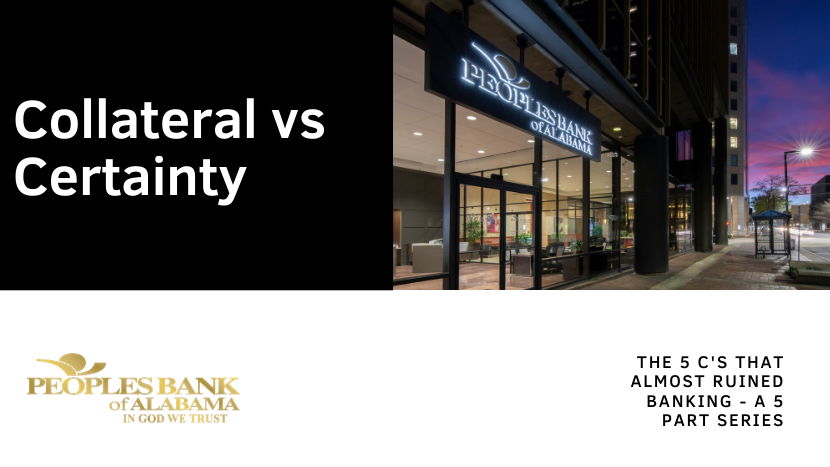The 5 C's That Almost Ruined Banking, Part 4

We are in part 4 of our 5 part series on changes we’ve seen in Small Business underwriting, specifically as applied to the “5 C’s of Credit." The prior articles focused on how the first three “C’s” called Character (a measurement of intentionality), Capacity (the borrower’s ability to repay the loan from operations) and Capital (the amount of cash or equity invested into the project by the borrower) have been replaced with the new words “Camouflage” (skeletons kept hidden in the closet), “Caffeine” (I want it all and I want it now) and “Compensation” (when banks are paying more attention to their own income statement than to the borrower’s). Many of the regulations we face today are the result of these mistakes.
Collateral
This installment reviews the fourth “C” called Collateral. Collateral refers to the assets the borrower pledges in the event the cash flow from the business cannot service the debt. Collateral is important because it provides the bank with a secondary source of repayment (just in case) and also demonstrates the borrower’s level of commitment to the transaction. In other words, it demonstrates what the borrower is willing to lose if the business doesn't perform. Collateral can take the form of various types of assets. The most common types of collateral are real estate, equipment, or business assets such as inventory or accounts receivable. The borrower signs a legal agreement allowing the bank to assume ownership of the Collateral, if needed. By putting your money where your mouth is, or so they say, Collateral is the evidence of the borrower’s intent to repay the loan regardless of what happens. Remember, the bank is not the business owner or investor. Our return is limited to the rate of interest we charge on the loan, so having a way to get our shareholder's money back in case the borrower fails is critical. Selling collateral is a worst-case scenario, last resort action for the bank. The last thing either of us want is to take this step. That's why following the 5 Fundamental C's of credit outlined in this series is so important.
Certainty
Many times Collateral is replaced by what I call Certainty. The pledging of Collateral does not repay loans – cash repays loans; however, some banks began making more risky loans because they believed they were “fully secured” by collateral. The lender was certain that if the business failed, the collateral could be converted to cash and used to pay off the loan. The problem with this is the assumption that collateral value would never decline. The idea that real estate values would fall by 30 or 40% never entered our minds. So, when the real estate bubble burst and property values began to fall, liquidating the collateral failed to generate the expected cash and banks began experiencing losses.
Thankfully, real estate values have rebounded and banks have returned to the tried and tested principles of underwriting business cash flow rather than relying on collateral value. Collateral is important - but never act like you are certain that the collateral value will be sufficient to repay the debt. While it is our responsibility to follow the 5 fundamental C’s in making a loan decision, it is equally important for you to understand them.
If you are already a bank customer, thank you for your loyalty and please let us know of any ways we can help. For those looking for a trusted banking partner, we'd love the opportunity to earn your business.
